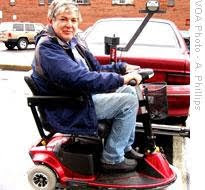The following is my July/August, 2010 column From Where I Sit for Voices of Central Pennsylvania:
I have been trying to shield my readers (until the appropriate time, like now) from the clear purpose of this monthly column: To foment a peaceful revolution that will hereafter change forever the daily lives of individuals with disabilities and those who are aged. Miriam-Webster’s Collegiate Dictionary defines revolution as “a fundamental change in political organization; esp.: the overthrow or renunciation of one government or ruler and the substitution of another by the governed.”
Non-violent revolution is the way we behave as a nation when fundamental change is required. Anyone who has observed or participated in two of the great revolutions in my lifetime—the Civil Rights Movement and the Women’s Liberation Movement—knows that the ballot box is the ultimate arbiter of who governs whom. For this year’s election it is necessary to get our elected officials to understand that those of us who cannot walk, see, or hear or who have elderly bodies demand a new kind of government – a government that (given our demographics) will enfranchise us as a movement capable of determining current and future elections.
The problem with a column like this is that it risks a stridency too great to take seriously. People with disabilities such as mine are lucky to live here. State College and Penn State are more wheelchair accessible than any place else I have lived in the 15 years I have been disabled. Central Pennsylvania, especially the Office of Vocational Rehabilitation (OVR), has provided me with a better array of social services than anyplace else I have lived, including North Carolina, California, Virginia (by reputation, when I was applying to George Mason University) and suburban Philadelphia (which was awful).
I had wanted to write this column as a tribute to my OVR counselor Carla Roser who retired last month. Carla was too modest to consent to an interview, one that would have focused on what made her especially effective and why Central Pennsylvania’s OVR offices, based in Altoona, are so much more efficient than the rest of the Commonwealth and most of the country.
Praise aside, good is not good enough. Happy Valley and its environs may be better than most, but what this area and the nation lacks is a clear understanding of what disabled and elderly individuals need, why we must organize and vote as a bloc, how we should be the people who govern our lives—the principle of self-government is self-government—and why colonial rule (over disability and elderly groups and institutions) must end. The colonials are often kind-hearted-souls who are not disabled or elderly. Some, however, have behaved with a sense of noblesse oblige reminiscent of 19th century European colonialism.
My columns, including what it is like to have a disability, assistive technology for people who are blind and what it is like to travel with a disability, will continue to serve as groundwork. Do not be lulled into
thinking that a seemingly gentle column is not part of a clearly stated intention that you understand what kind of power we need and how we must work to get it.
Meanwhile, readers interested in how my thoughts are developing regarding the disability and elderly rights movement are urged to read Robert A. Caro’s Pulitzer Prize winning biography Lyndon Johnson,
Master of the Senate, for background on how our 36th president obtained the power to create the Civil Rights Act and Medicare.
I also refer you to Taylor Branch’s astonishingly well-written and detailed trilogy of Martin Luther King, Jr. and the Civil Rights Movement, a trilogy that describes how Dr.King used clear strategy to overcome.
Meanwhile, this columnist must exercise some restraint. My original intent for this summer was to list 10 things that need doing in Centre County so we know who our friends are, whom we need to vote out of office, where we need to picket and what we need to boycott.
Instead, I am simply requesting all candidates on the ballot here in State College, regardless of office or party, provide me with a written pledge that they will:
1) Only appear at political events or campaign locations that are wheelchair accessible
2) Use rudimentary Braille (inexpensive) located in a clearly identified location
3) Provide clear (but not necessarily expensive) signage and sign language and other interpreters when practical
Candidates, please send a copy of your pledges to the email address below. September and October issues of this column will list candidates providing pledges and provide comments on those who fail to reply.
Joel Solkoff wrote The Politics of Food. Contact him at jsolkoff@gmail.com.
Subscribe to:
Posts (Atom)



